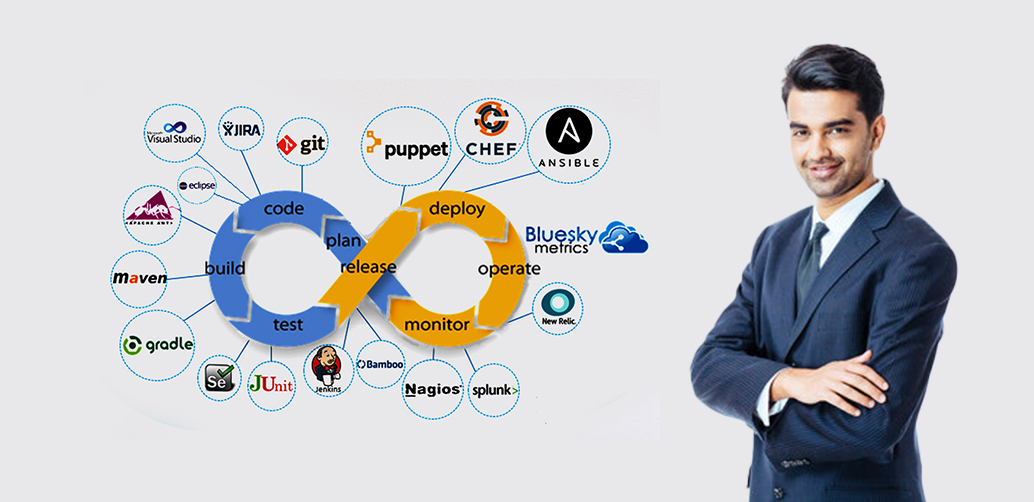Software development involves a lengthy and multi-stage workflow. Businesses developing in–house software applications need quality products and solutions that meet end-user’s needs and help keep operations optimal. It is no longer about just hiring a skilled team of developers; businesses have become particular about using the methodology used for developing software too. A majority of brands embrace the agile development process, and that explains why DevOps development services are so much in demand.
Getting the basics of DevOps methodology clear
To ensure the software development process is kept on the fast track, and product quality gets enhanced, the DevOps methodology was invented. Within a few years, it has become the default software development method in many countries. It is hard to define DevOps in a single sentence. It is denoted as a set of practices for automating processes between IT teams and developers. It is also defined as the union of people, products, and processes to facilitate the non-stop delivery of value to the end-users. Technically, both definitions are accepted.
Overall, DevOps is a procedure used in software development that removes the hurdles existing between operations and development. Each team involved can collaborate freely, and delays and conflicts can be resolved faster.
How does it work?
DevOps, as a flexible software lifecycle management model, puts emphasis on end-to-end processes by eliminating gaps between stakeholders, engineers, and IT staff. So, DevOps covers all types of activities required for the timely delivery of required software to the users. So, organizations deploying this software lifecycle management model can become more productive, save time and evade operational costs.
The foundation of DevOps
The DevOps culture and methodology are based on some pillars. These are:
- Collaboration/ Teamwork- DevOps was created to eliminate hassles caused by Disconnections and miscommunication, as it is. So, strong collaboration between all the teams is a prerequisite. DevOps works when all the teams and members coordinate in an efficient manner.
- Continuous integration- DevOps culture focuses on the theory of continuous integration. Integration between the developers and other teams highlights areas of conflict, and those can be handled soon. This is why frequent communication is required in this procedure.
- Automation- To a large extent, DevOps is dependent on automation. So, picking the apt tool is crucial for its success and process execution sans errors.
- Continuous testing- A core principle of DevOps is continuous testing. This is done during integration and delivery. This helps cut down development costs and reduce the risk of application failure and malfunction. The companies developing the applications can adhere to norms better, and end-user needs are met. Testing is also done to eliminate security loopholes in the applications. Continuous testing commences in the development phase.
- Continuous delivery- In continuous delivery, alterations in coding are automatically created, prepared, and tested for production release. So, developers are better prepared for product delivery. Through continuous delivery, users can receive updates and patches without delay and any compromise on quality.
- Continuous monitoring- In DevOps, monitoring begins with the development phase, much like testing. There are two types of monitoring involved, namely server monitoring and application performance monitoring. The monitoring process is usually automated. Through Continuous monitoring, teams can minimize quality issues and resolve problems fast. It also lets the IT team update the developers on various issues fast.
How can businesses gain from embracing DevOps?
Businesses that choose this method for developing software applications gain in a number of ways. These are:
- Instant deployment of systems and apps- When DevOps is deployed, businesses can deploy new systems in the software development cycle without woes. Innovation and continuous deployment are an integral part of it and so deploying new systems is smooth.
- Agility- With DevOps, businesses can achieve the required scalability and function in a more agile manner.
- Money-saving- Organizations that are keen on avoiding unnecessary costs involved in software development should hire suitable DevOps consulting services. Through DevOps, many repetitive tasks are automated, and the risk of error is minimized significantly. So, unnecessary cost factors are eliminated. Automation requires reduced manpower, and that can help organizations save money.
- No Silos: In DevOps, the developers and operations team are in touch with other teams at all times. So, any silo is eliminated. The level of transparency is high, and the same can be said about intra-team collaboration.
- Speed- Since in DevOps, various teams are in touch with one another, and greater collaboration is there, speed of software development is enhanced.
- Continuous delivery- Earlier, the linear method was used in the software development sector. A software application was coded, developed, tested, and delivered in separate phases. Now, the application development phases are interlinked. So, sync between the teams is better and continuous. It enables businesses to develop and deliver software faster, and bringing out newer versions of applications does not take much time either.
Challenges of DevOps deployment and ways to overcome these
The advantages of DevOps notwithstanding, an organization may face a few hurdles while trying to deploy the procedure. The good thing is with proper planning and assistance of a suitable DevOps consulting company in India; these can be dealt with.
- Transitional Challenges- Businesses using legacy systems face hurdles in deploying a flexible software lifecycle management model like DevOps. These include both organizational and technological issues. Tweaking the internal processes and rebuilding the teams may be necessary before deploying DevOps.
- Lack of Talent- Sometimes, finding a skilled DevOps team can be tough. For some organizations, hiring skilled DevOps Engineers can be tough owing to their steep pay scale. Thankfully, nowadays, you can opt for DevOps services outsourcing.
- Toolset- Picking the right DevOps tools can be tough for some business owners. This can be a problem when you are making a switchover to the methodology. A skilled DevOps consultant, however, can guide you on picking the right tool matching your application development needs.
Making DevOps deployment in your company easier
Switching to a software lifecycle management model in an organization may not be a cakewalk, but you can prepare and plan well to smoothen the hurdles on the way. With a proper transition plan and concrete roadmap, making a switchover to DevOps will be easier-both for the staff and the management.
- Risk assessment- You have to execute a risk assessment analysis, and for that, you can surely hire a consultant. Such an expert can analyze the existing workflow and processes in your company and suggest changes for switching to DevOps methodology. Every company needs a well-made strategy to adopt this model for software development, and customizations are necessary. A thorough risk assessment is part of that planning.
- Building the teams- You can choose from existing staff and also hire new ones to develop specific teams for effective DevOps implementation. Skill assessment and readiness of the staff are necessary for this.
- Change in culture- To gain from DevOps implementation in the company, the work culture has to be apt. You will need tools for knowledge sharing and effective communication to begin with. The staff need to undergo required training to adopt the methodology as well.
- DevOps Best Practices adoption- These include:
- Continuous integration and delivery
- Agile project management
- Test automation
- Cloud migration
- Infrastructure as Code
- Constant app data monitoring
5. Starting small- When you plan DevOps implementation in the company, start with small-sized projects. This will help in resolving issues that arise during migration. Once the teams get comfortable with the new methodology, taking up large projects is prudent.
Summing it up
DevOps implementation can be beneficial for enhancing the software development process in any organization. However, it is important to assess the organizational readiness for its deployment. You also need to obtain a suitable migration strategy for implementing this methodology in the organization. Eventually, you will gain from the assistance of a veteran DevOps consultant agency.

 Web and Full Stack
Web and Full Stack CMS and Frameworks
CMS and Frameworks Online Marketing
Online Marketing Cloud Services
Cloud Services ECommerce
ECommerce Mobile
Mobile



